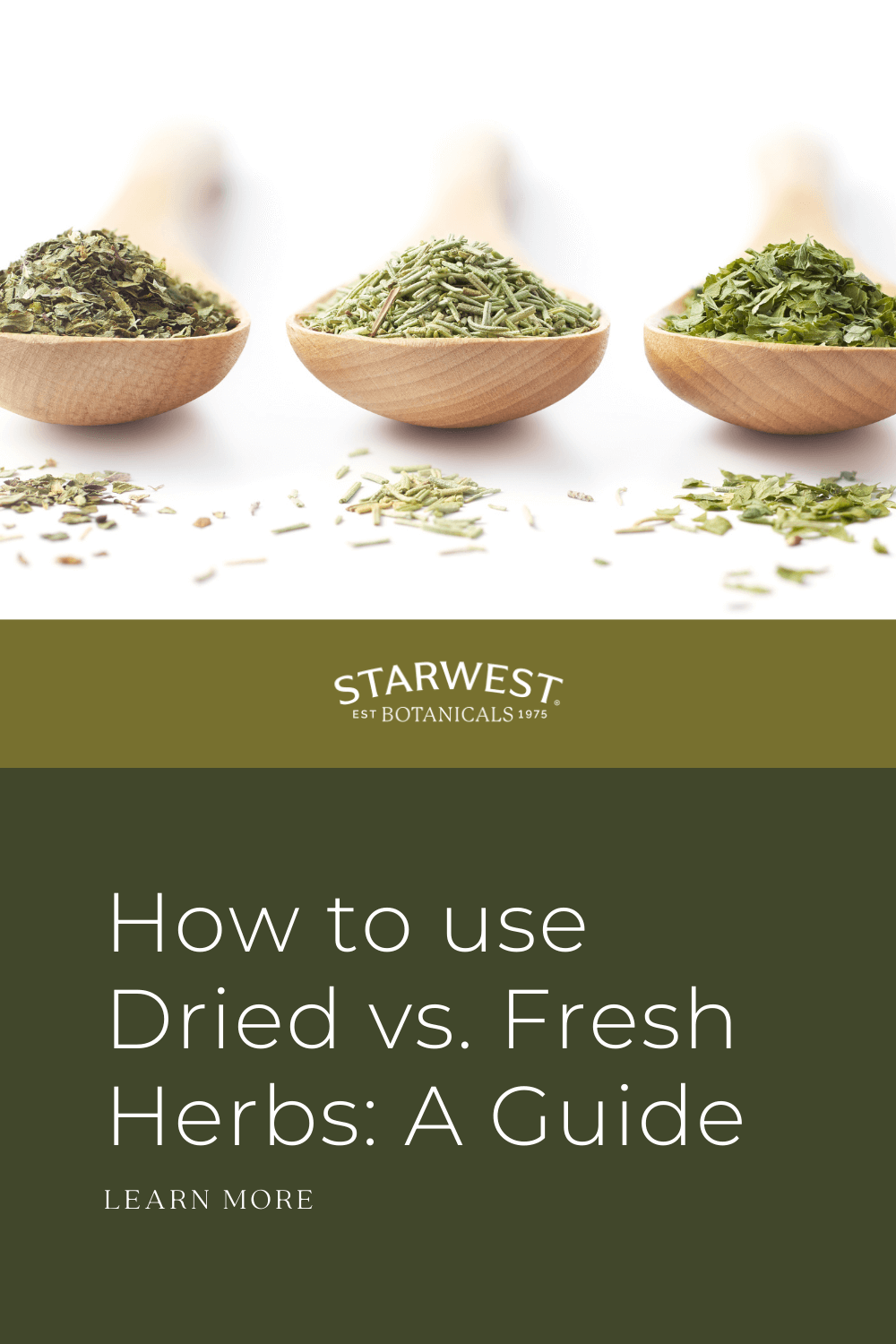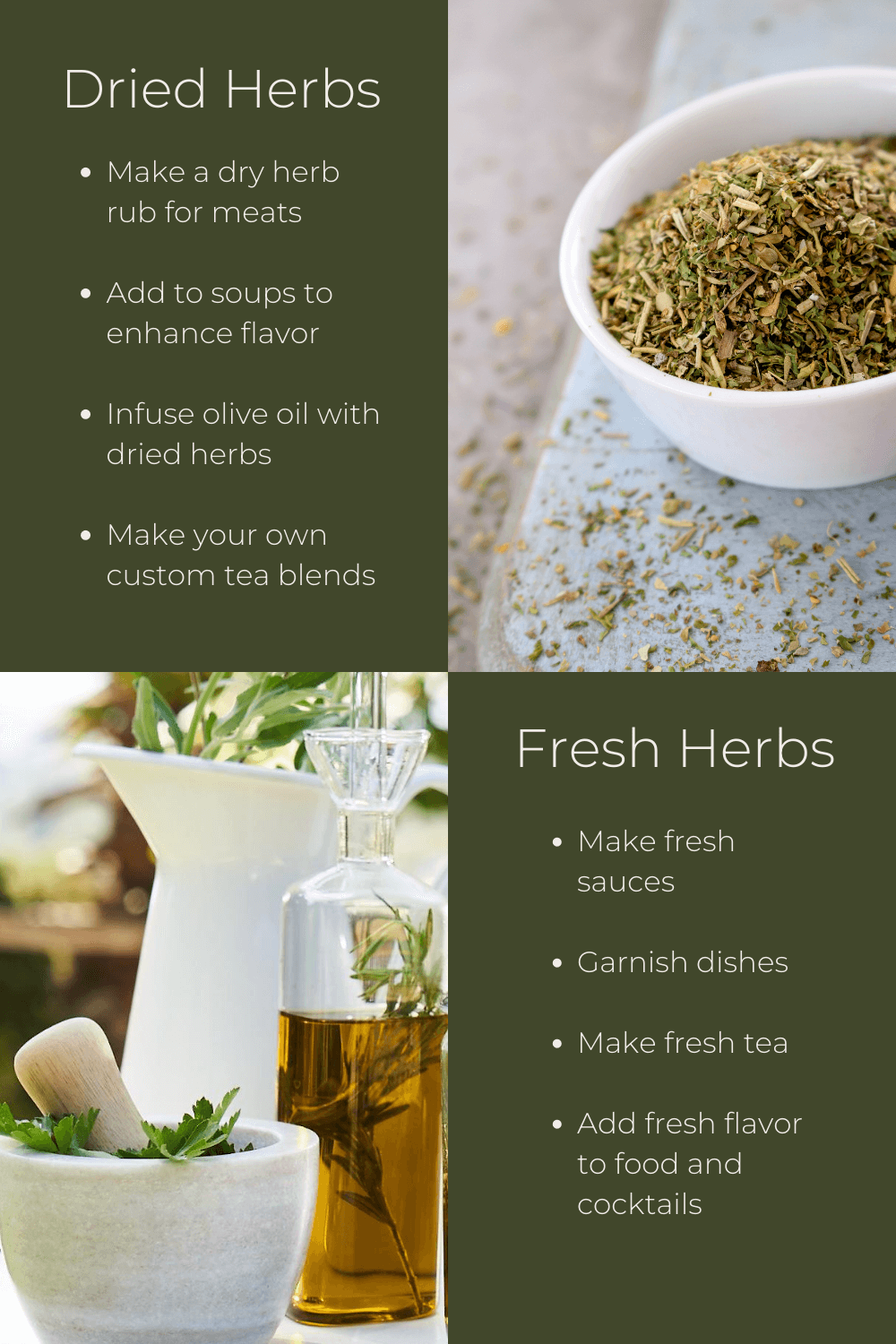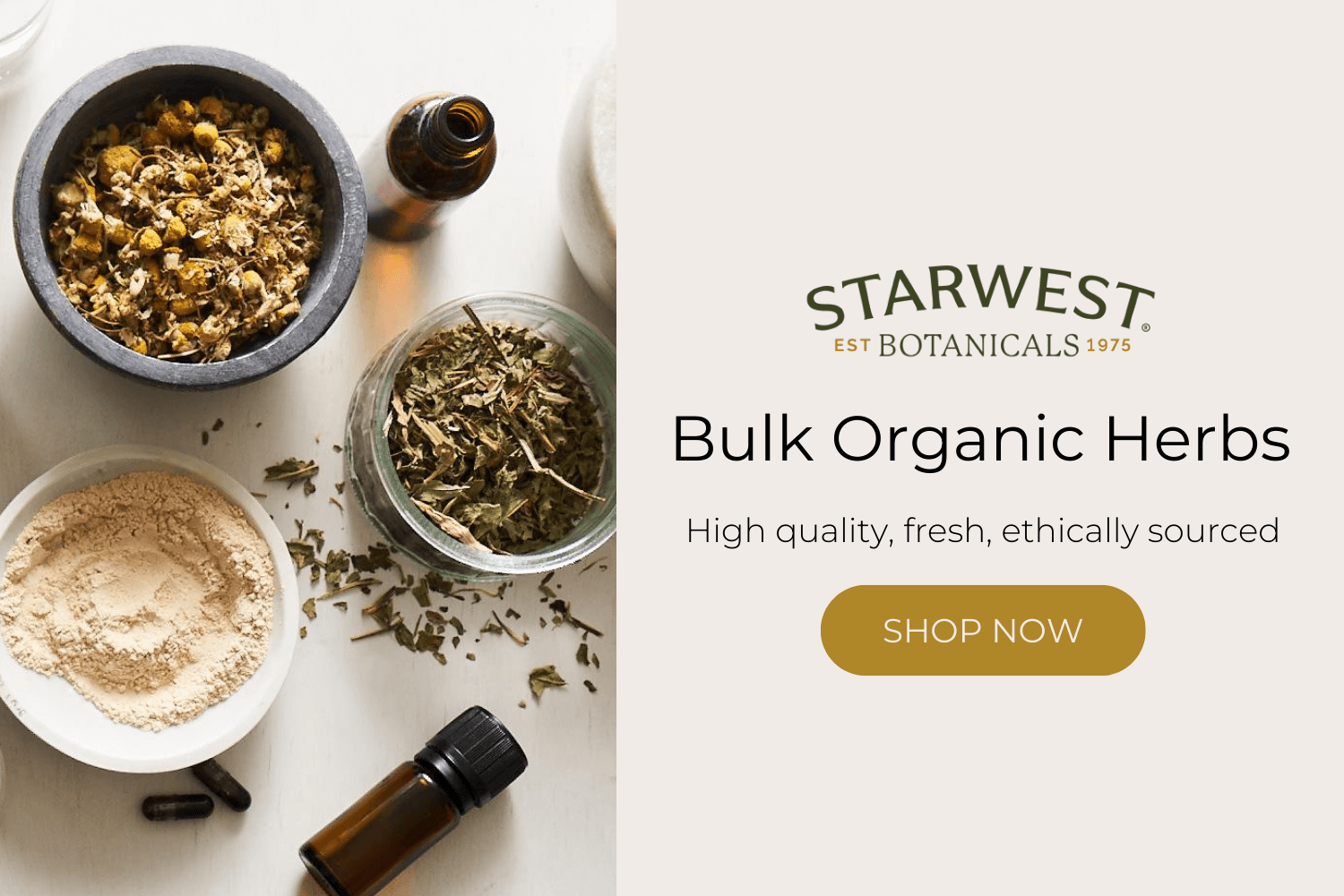How to Use Dried vs. Fresh Herbs: A Guide | Starwest Botanicals
Posted by Starwest Botanicals on 11-14-2022

Herbs are one of nature’s finest gifts. Whether it’s tangy dill or peppery mint, incorporating soft herbs into your cooking can level up any practical recipe. Plus, they’ve even found their way into plant-based skin care regimens, health-conscious teas, and home fragrances.
Such a powerful tool must be wielded carefully though—herbs have different levels of potency depending on whether they are a dried vs. fresh herb.
In this helpful guide, you’ll learn more about the differences between dried vs. fresh herbs and how you can incorporate them into your traditional recipe, self-care routine, cocktail, and more.
What Are Fresh Herbs?
Fresh herbs are leafy greens and flowers that have been harvested from a living plant. They aren’t cured or dried, so the fresh ones must be used within a few days of harvesting before they spoil.
Fresh herbs can be found in the wild or on store shelves. However, one of the easiest ways to source them is by growing them yourself. Many common herbs are simple to cultivate, and can even be grown indoors. Since fresh herbs spoil quickly, keeping the whole plant around may save you money in the long run.
When to Use Fresh Herbs
Fresh herbs have a much higher water content than dried herbs. They also contain natural oils, which contribute to their complex tastes and aromas. These oils are destroyed by heat, so fresh herbs are best used as a final garnish or in dishes that aren’t cooked.
Here are a few uses for fresh herbs:
- FreshBasil – Grind fresh basil with extra virgin olive oil, pine nuts, parmesan cheese, and garlic to make a yummy pesto sauce. If you want to add some complexity to your cocktails, pair it with gin or vodka for a garden-fresh sipper.
- Fresh Cilantro –Fresh cilantro is a perfect garnish for a wide variety of dishes. Add chopped cilantro to guacamole, curry, or pho for a complex finish.
- Fresh Mint – Fresh mint tea is more than just delicious– research shows that peppermint oil may be effective as a treatment for nausea and inflammation. Be sure to grind your fresh mint leaves while brewing to release these natural oils.

What Are Dried Herbs?
Dried herbs, of course, start out as fresh herbs. The difference is that they’re dehydrated soon after harvesting. Looking to learn how to store dried herbs ? Dried herbs typically have a much longer shelf life than fresh herbs. A dried herb can be used for more than a year without spoiling, and have a peak potency range of about three months.
Are Dried Herbs Stronger Than Fresh Herbs?
The drying process simplifies some of the flavor complexities present in fresh herbs. This small sacrifice means that the flavor of dried herbs can be three to four times stronger than that of fresh herbs—perfect for your taste buds and your wallet.
One teaspoon of dried herbs delivers the same intensity of flavor as a tablespoon of fresh herbs. Keep this conversion reference handy when replacing one for the other.
When to Use Dried Herbs
Dried herbs are ideal for seasoning hot dishes and infusions. Here are just a few ways to cook with dried herbs:
- Make a dry herb rub for meats.
- Add dried herbs to stews and soups to enhance the flavor.
- Infuse olive oil with dried herbs. Use it over salads or serve with warm bread.
- Blend dried herbs to create your own tea
Beyond the Plate: Other Uses for Dried Herbs
Delicate herbs are aromatic, and they’re loaded with useful properties. With a long shelf-life and affordable price tag, there are plenty of easy ways to help improve your health and happiness with dried herbs:
- Soothe and sleep –Lavender may help to alleviate stress and support restful sleep. Fill a few cloth sachets with dried lavender and place them in drawers and beneath pillows for a fresh scent and calming atmosphere.
- Healthy hair – Research shows that rosemary may support scalp health and hair growth. Try adding dried rosemary to apple cider vinegar to create a nourishing hair rinse.
- Spruce up with scent – No matter if it’s dried sage, rosehip, geranium, or lemon balm, dried herbs are terrific for lending scent to homemade products. Chop them up and use them for candle making or potpourri, or infuse them in coconut oil for a natural perfume.
- Overall Health and Wellness - By incorporating herbal medicine into your existing wellness practice, you may give your immune system the support it needs to keep you feeling your best.
Sourcing Herbs with Starwest Botanicals
By now, you’re well-versed on the differences between fresh and dried herbs and probably want to know the difference between herbs vs spices. You know what they are and how to use them—all that’s left is where to get them from.
Starwest Botanicals has been a trusted name in the dried herb business since 1975. Whether you need thyme, basil, oregano, parsley, or sage, we have plenty. We’re confident in the quality of our products and back them with a 100% satisfaction guarantee. Head over to our herbal shop to browse our varied selection of dried herbs, herbal extracts, teas, and more.
Whether you’re a flavor-chaser, a wellness-seeker, or a candle-maker, Starwest Botanicals is honored to supply you quality botanicals, guaranteed.
Sources:
The Spruce. How to Grow Herbs Indoors… https://www.thespruce.com/how-to-grow-herbs-indoors-on-a-sunny-windowsill-1403425
Pub Med. Effect of… peppermint oil in the treatment of irritable bowel syndrome. https://pubmed.ncbi.nlm.nih.gov/19008265/
Fine Dining Lovers. Fresh vs. Dried Herbs: Pros and Cons. https://www.finedininglovers.com/article/fresh-vs-dried-herbs
Cleveland Clinic. Health Benefits of Lavender. https://health.clevelandclinic.org/health-benefits-of-lavender/
Medical News Today. How to use rosemary oil for hair growth. https://www.medicalnewstoday.com/articles/319444#research



